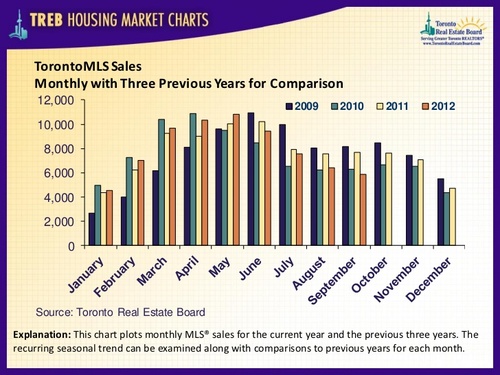Toronto Income Property Newsletter – November 2012
Whilst there has been a lot of talk about the Toronto real estate market slowing down, it hasn’t really happened with income properties in the Central core as yet. I expect properties that do not generate sufficient cash flow will not continue to trade as quickly as they have over the past two years. Prudent investors will not continue to jump at cap rates under five. Quality owner occupied income properties in great shape and in top locations however will continue to trade for top dollar. As the overall market slows, I believe that great duplexes and triplexes will be the last to suffer (if at all).
*
There are a variety of differences between commercial and residential tenancies in Ontario and the rights and obligations for both landlords and tenants. How can a commercial landlord act so quickly to evict a tenant or raise rent, whereas a residential landlord has no such rights? It may take several months to evict a residential tenant who has stopped paying rent while a commercial landlord need only give one month’s notice and then they can call the Bailiff. There are significant legal ramifications to the leases that you would execute in each situation. So why is there such disparity?
The following information comes from Palmer Leong, Toronto solicitors:
The reason for these differences is that the laws governing the two types of leases are quite different. A commercial lease is a contract between the two parties – the commercial landlord and tenant. There are not a lot of limits under the law as to what can be contracted for in a commercial lease situation. The landlord and tenant are pretty much free to include a variety of provisions in this sort of lease. However, the commercial lease usually specifies obligations for both parties including rent, maintenances, operating costs, etc. Ontario’s Commercial Tenancies Act outlines the relationship between the landlord and tenant, but a signed commercial lease may take precedence over anything in the Act. In contrast, residential leases are always governed by the rules and regulations of the Residential Tenancies Act and the Ontario Landlord and Tenant Board. This Act seeks to protect residential tenants in a variety of ways and will always take precedence over the provisions of a residential lease. Tenants can enforce their rights under the Act by filing an application against their landlord with the Board.
Under commercial leases, landlords have the right to terminate a lease when tenants fail to fulfil their obligations as outlined in the lease, such as paying monthly rent. Most commercial leases are signed for a specific term (for example, five years). Once that term is expired, the tenancy ends, and the tenant has no right to occupy the premises anymore. However, if both the landlord and tenant agree that the tenant can stay, the tenancy becomes a month-to-month. This means that the tenant can stay at the rental premises as long as the tenant keeps paying rent and the landlord has no need to kick the tenant out. All the landlord needs to do is give the tenant a notice period of one month if the landlord wants to end the rental relationship at this point. This could lead to disastrous financial and business consequences for the tenant. Tenants should always make sure to include a provision in the original commercial lease to provide for extensions to the term of the lease to be protected from this situation.
Under a residential lease, the landlord is constrained by the provisions of the Residential Tenancies Act. A landlord cannot simply end the tenancy as one would under a commercial lease arrangement. The landlord has to show a good reason for the eviction and must get the tenant to agree to move out. The tenant can force the landlord to attend at a hearing with the Landlord and Tenant Board if he or she does not agree to move out. At a hearing, the Landlord must then try to convince an adjudicator that his or her reasons for eviction are legitimate so that the adjudicator will sign an order to evict the tenant. This process is very time consuming and can be complex. At this point, it would be beneficial for the landlord or tenant to obtain legal advice from a lawyer so that they know their options.
The Commercial Tenancies Act does not regulate rent or rent increases. Most commercial leases will spell out exactly the amount of rent that will be charged in the lease, as well as a schedule for any rent increases. However, if the lease expires and the term is up, commercial landlords can charge any rent that they wish to charge. For most residential leases, the rent increases are capped by the Residential Tenancies Act. These caps are set each year by the Ministry of Municipal Affairs and Housing and are usually around 3 to 3.5%.
It is extremely important to look closely at a commercial lease if you are thinking of either buying a business or subleasing a rental unit from another commercial tenant. It is also crucial to look at the term of the lease and whether or not there is a tenant’s right for renewal of that term under the lease agreement. Absence of this right could mean trouble for your business if the commercial lease is coming to an end. When it comes to signing either a commercial or residential lease, it is best to contact a lawyer and get legal advice well before you sign the document. This will allow you to know your legal rights and obligations under that lease.
*
Overall home sales for September 2012 dropped 21% from 2011 which has many folks suggesting that the market is beginning to finally slow down. Let’s see if October and November numbers follow suit.



